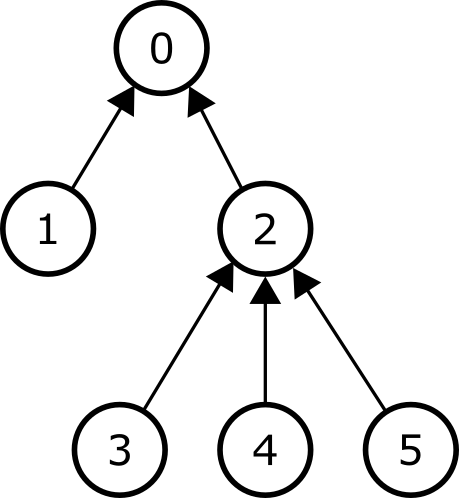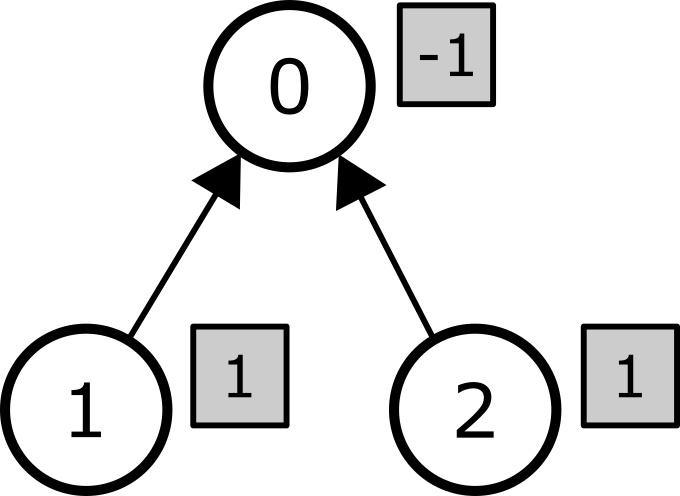Consider a tree consisting of  vertices,
numbered from
vertices,
numbered from  to
to  .
Vertex
.
Vertex  is called the root.
Every vertex, except for the root, has a single parent.
For every
is called the root.
Every vertex, except for the root, has a single parent.
For every  , such that
, such that  ,
the parent of vertex
,
the parent of vertex  is vertex
is vertex ![P[i]](//static.dmoj.ca/mathoid/162e37f6f24f3006b36924b55ddb240b4f374488/svg) , where
, where ![P[i] < i](//static.dmoj.ca/mathoid/db01b1b736abf36108da33fcc1b2822cf8e34701/svg) .
We also assume
.
We also assume ![P[0] = -1](//static.dmoj.ca/mathoid/0cee0df93fb7703701cd548940bfd21011ae3bee/svg) .
.
For any vertex  (
( ),
the subtree of
),
the subtree of  is the set of the following vertices:
is the set of the following vertices:
 , and
, and- any vertex whose parent is
 , and
, and
- any vertex whose parent's parent is
 , and
, and
- any vertex whose parent's parent's parent is
 , and
, and
- etc.
The picture below shows an example tree consisting of  vertices.
Each arrow connects a vertex to its parent,
except for the root, which has no parent.
The subtree of vertex
vertices.
Each arrow connects a vertex to its parent,
except for the root, which has no parent.
The subtree of vertex  contains vertices
contains vertices  and
and  .
The subtree of vertex
.
The subtree of vertex  contains all
contains all  vertices of the tree
and the subtree of vertex
vertices of the tree
and the subtree of vertex  contains only vertex
contains only vertex  .
.
Each vertex is assigned a nonnegative integer weight.
We denote the weight of vertex  (
( ) by
) by ![W[i]](//static.dmoj.ca/mathoid/ece1493c6e27f180b99669f56f2cea8ba29ba07c/svg) .
.
Your task is to write a program that will answer  queries,
each specified by a pair of positive integers
queries,
each specified by a pair of positive integers  .
The answer to the query should be computed as follows.
.
The answer to the query should be computed as follows.
Consider assigning an integer,
called a coefficient, to each vertex of the tree.
Such an assignment is described by a sequence ![C[0], \ldots, C[N-1]](//static.dmoj.ca/mathoid/ff1f1b2dbd453781792edd1a84ce28223e6fe514/svg) ,
where
,
where ![C[i]](//static.dmoj.ca/mathoid/59e68343fbc635d9c75334bbd06cbd25ff3a5a2d/svg) (
( ) is the coefficient assigned to vertex
) is the coefficient assigned to vertex  .
Let us call this sequence a coefficient sequence.
Note that the elements of the coefficient sequence can be negative,
.
Let us call this sequence a coefficient sequence.
Note that the elements of the coefficient sequence can be negative,  , or positive.
, or positive.
For a query  ,
a coefficient sequence is called valid
if, for every vertex
,
a coefficient sequence is called valid
if, for every vertex  (
( ),
the following condition holds:
the sum of the coefficients of the vertices in the subtree of vertex
),
the following condition holds:
the sum of the coefficients of the vertices in the subtree of vertex  is not less than
is not less than  and not greater than
and not greater than  .
.
For a given coefficient sequence ![C[0], \ldots, C[N-1]](//static.dmoj.ca/mathoid/ff1f1b2dbd453781792edd1a84ce28223e6fe514/svg) ,
the cost of a vertex
,
the cost of a vertex  is
is ![|C[i]| \cdot W[i]](//static.dmoj.ca/mathoid/2e3a9f4af4d6aa79d6bb63818e7d1af19b90819d/svg) ,
where
,
where ![|C[i]|](//static.dmoj.ca/mathoid/a410fcb6f2946ddb1eb0b7db4043dfaad1c57c0c/svg) denotes the absolute value of
denotes the absolute value of ![C[i]](//static.dmoj.ca/mathoid/59e68343fbc635d9c75334bbd06cbd25ff3a5a2d/svg) .
Finally, the total cost is the sum of the costs of all vertices.
Your task is to compute, for each query,
the minimum total cost that can be attained by some valid coefficient sequence.
.
Finally, the total cost is the sum of the costs of all vertices.
Your task is to compute, for each query,
the minimum total cost that can be attained by some valid coefficient sequence.
It can be shown that for any query, at least one valid coefficient sequence exists.
Implementation Details
You should implement the following two procedures:
Copy
void init(std::vector<int> P, std::vector<int> W)
 ,
,  : arrays of integers of length
: arrays of integers of length  specifying the parents and the weights.
specifying the parents and the weights.- This procedure is called exactly once
in the beginning of the interaction between the grader and your program in each test case.
Copy
long long query(int L, int R)
 ,
,  : integers describing a query.
: integers describing a query.- This procedure is called
 times after the invocation of
times after the invocation of init in each test case.
- This procedure should return the answer to the given query.
Constraints


![P[0] = -1](//static.dmoj.ca/mathoid/0cee0df93fb7703701cd548940bfd21011ae3bee/svg)
![0 \leq P[i] < i](//static.dmoj.ca/mathoid/7df4610378cfc806495f01ec7d6fb388af0ff9c6/svg) for each
for each  such that
such that 
![0 \leq W[i] \leq 1\,000\,000](//static.dmoj.ca/mathoid/ae36f60a45502c43db548289b9512f4a3311d5ac/svg) for each
for each  such that
such that 
 in each query
in each query
Subtasks
Examples
Consider the following calls:
Copy
init([-1, 0, 0], [1, 1, 1])
The tree consists of  vertices, the root and its
vertices, the root and its  children.
All vertices have weight
children.
All vertices have weight  .
.
Copy
query(1, 1)
In this query  ,
which means the sum of coefficients in every subtree must be equal to
,
which means the sum of coefficients in every subtree must be equal to  .
Consider the coefficient sequence
.
Consider the coefficient sequence ![[-1, 1, 1]](//static.dmoj.ca/mathoid/2d646f0a495c30750b4bbf6323be829270018c27/svg) .
The tree and the corresponding coefficients (in shaded rectangles) are illustrated below.
.
The tree and the corresponding coefficients (in shaded rectangles) are illustrated below.
For every vertex  (
( ), the sum of the coefficients of all vertices
in the subtree of
), the sum of the coefficients of all vertices
in the subtree of  is equal to
is equal to  .
Hence, this coefficient sequence is valid.
The total cost is computed as follows:
.
Hence, this coefficient sequence is valid.
The total cost is computed as follows:
Therefore the total cost is  .
This is the only valid coefficient sequence,
therefore this call should return
.
This is the only valid coefficient sequence,
therefore this call should return  .
.
The minimum total cost for this query is  ,
and is attained when the coefficient sequence is
,
and is attained when the coefficient sequence is ![[0, 1, 1]](//static.dmoj.ca/mathoid/5ebfcee9942d298cc49915f240df83c36cd27608/svg) .
.
Sample Grader
Input format:
Copy
N
P[1] P[2] ... P[N-1]
W[0] W[1] ... W[N-2] W[N-1]
Q
L[0] R[0]
L[1] R[1]
...
L[Q-1] R[Q-1]
where ![L[j]](//static.dmoj.ca/mathoid/770c3f6f93d76b9db63049733cd6ca218761eca1/svg) and
and ![R[j]](//static.dmoj.ca/mathoid/6c01beed1914f7247da74b19551324a4b46e7cff/svg) (for
(for  )
are the input arguments in the
)
are the input arguments in the  -th call to
-th call to query.
Note that the second line of the input contains only  integers,
as the sample grader does not read the value of
integers,
as the sample grader does not read the value of ![P[0]](//static.dmoj.ca/mathoid/f9cd5918cc15ed6a4a23273bad5dbf92b21dd2d4/svg) .
.
Output format:
Copy
A[0]
A[1]
...
A[Q-1]
where ![A[j]](//static.dmoj.ca/mathoid/af8ab15610a4e9a1ef3da6148ca257301529264f/svg) (for
(for  )
is the value returned by the
)
is the value returned by the  -th call to
-th call to query.
Attachment Package
The sample grader along with sample test cases are available here.


Comments